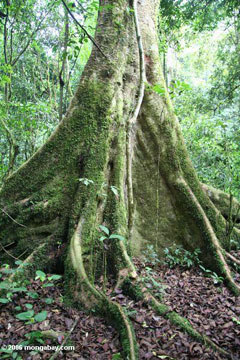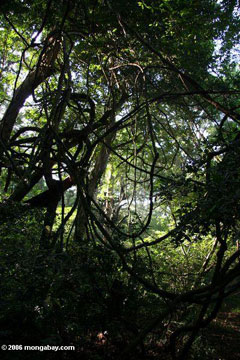President Museveni needs to do what’s best for Uganda
President Museveni needs to do what’s best for Uganda
mongabay.com Editorial
December 14, 2006
In recent months Ugandan president Yoweri Museveni has moved to destroy some of Uganda’s last remaining primary rainforests to give land to politically-connected plantation owners. Personally intervening in two disputes, one in Mabira Forest Reserve and the other on Bugala island in Lake Victoria, Museveni has argued that his country urgently needs such projects to industrialize and bring a better quality of life to Ugandans. He would be wrong.
Sugar cane and oil palm plantations are not going to save Uganda. The country needs to focus less on agriculture, which is responsible for more than 80 percent of employment in Uganda but only 31 percent of its economy, and more on services, like tourism, which generate nearly half of its income despite employing only 13 percent of its workers. Boosting the services sector would generate more bang for the buck.
Museveni’s recent actions do little for the economy and threaten to undermine his international credibility by calling into question his commitment to democracy and the rule of law in Uganda. Further, destroying some of Uganda’s few remaining primary forests for oil palm and sugar plantations, low-value industries at best, would be a significant loss to current and future generations of Ugandans and a long-term setback to the ecological viability of the country.
A push in the wrong direction

|
According to the Ugandan newspaper Daily Monitor, earlier this week Museveni told parliament: “It is on account of the urgent need for industrializing our very backward country … Our backwardness is on account of the absence of industries. The problems of Africa are not lack of forests but lack of factories, real estate, professional services.”
While the lack of forests may not be the root cause of Africa’s problems there is little evidence to show that widespread deforestation has done much to help the continent economically since the end of colonialism. In fact, some would argue that on a relative basis, most Africans are poorer than they have ever been before. Environmental problems are certainly not be helping their cause. A desertification conference in Algiers, Algeria next week will attest to this point.
Natural forests: a national treasure
As of the most biodiverse countries in Africa, Uganda is biologically and culturally rich but materially poor. This is unfortunate, but there may be ways to harness this biodiversity to bring a better livelihood to the people of Uganda, instead of destroying the source of this biological richness: its forests. Biodiversity in Uganda is dependent on native forests, not oil palm plantations, sugar cane fields, or even replanted forests. Without these forests, there will be less biodiversity to attract eco-tourists, who already spend millions visiting gorillas in Bwindi and seeing safari animals across Uganda’s magnificent national parks. Water filtration and other ecosystem services will be reduced and there will be less vegetation to anchor soils and prevent erosion, land degradation, and sedimentation in Lake Victoria. Ugandans will further lose an important source of healing plants and crop pollinators. These net losses will leave Uganda a poorer place.
Primary forests are a rare and precious thing in a country that has one of the highest deforestation rates in the world, as measured by the percentage of forest loss between 2000 and 2005. Over the past fifteen years, Uganda lost 26.3 of its forest cover according to the U.N., and worse, deforestation rates have accelerated by 18 percent since the close of the 1990s.
Getting paid for forests as well as reaping ecological rewards
Under an initiative proposed by a coalition of tropical countries and endorsed by the World Bank and U.N., cutting deforestation to zero could net Uganda tens millions of dollars while preserving biodiversity and ecosystems services. So really how much is another sugar farm worth to Uganda? What about another oil palm plantation? Surely the small short term gain for a select group of people isn’t worth the long-term sacrifice to the country as a whole, is it?
Uganda would be better served by Museveni pushing conservation of native forests and rehabilitation of deforested lands of which there are plenty in Uganda. Oil palm plantations and sugar cane fields can be planted on degraded land using farming techniques that can both sequester carbon and improve soil productivity, much to the benefit of Ugandans. Further, setting aside natural forests as protected areas will preserve valuable ecological services that people and the government can ill afford to replace.
It’s time for Museveni to do the right thing.
President Yoweri Museveni: respect the sanctity of national parks and look out for the long-term interests of Ugandans. Don’t handout tracts of primary forest for short-term development schemes that will benefit few and carry a large ecological cost. Despite what Environment Minister Maria Mutagamba says, primary forests cannot be regrown, at least not in your lifetime or even you grandchildren’s lifetime. These forests are irreplaceable. Once they disappear they are effectively gone for several generations of Ugandans. It’s time to step up as a responsible leader, your country needs you.















